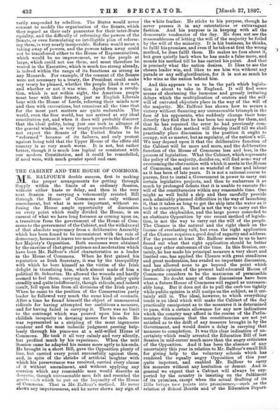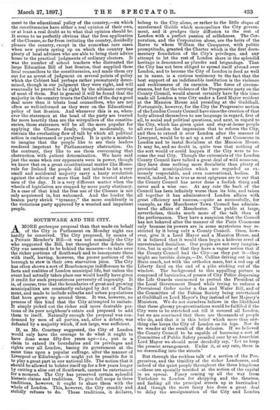THE CABINET AND THE HOUSE OF COMMONS.
MR. BALFOUR'S double success, first in making the proper arrangements for getting through Supply within the limits of an ordinary Session, without either haste or delay, and then in the very next Session in carrying a vehemently resisted Bill through the House of Commons not only without amendment, but what is more important, without re- fusing the House ample opportunity of discussion on every point which really divided the House, is an earnest of what we have long foreseen as coming upon us, a transition from the government of the House of Com- MODS to the government of the Cabinet, and the withdrawal of that absolute supremacy from a deliberative Assembly which has been found to be inconsistent with the rule of democracy, because it leaves too much power in the hands of her Majesty's Opposition. Both successes were obtained by the exercise of that great patience and moderation which have been Mr. Balfour's chief characteristics as a leader in the House of Commons. When he first gained his reputation as Irish Secretary, it was by the tranquillity with which he bore himself as the victim of the Irish delight in transfixing him, which almost made of him a political St. Sebastian. He allowed the wounds and hardly seemed to feel them, carrying out his Irish policy quite steadily and quite indifferently, though ridicule, and indeed insult, fell upon him from all divisions of the Irish party. When he came to the position of the Conservative party leader he followed very much the same kind of counsels. After a time he found himself the object of unmeasured ridicule for having attempted too ambitious a measure, and for having failed in carrying it. There was no limit to the contempt which was poured upon him for his childish incapacity in devising means for his ends. He was represented as a stripling of the most ingenuous candour and the most imbecile judgment peering help- lessly through his pince-nez at a self-willed House of Commons. He took it all very calmly and very silently, but profited much by his experience. When the next Session came he adapted his means more aptly to his ends. He brought in a short Bill, gave the Opposition plenty of line, but carried every point successfully against them, and, in spite of the shrieks of artificial laughter with which his perseverance was received, carried every clause of it without amendment, and without applying any -coercion which any reasonable man would describe as despotic, though unreasonable men felt and resented the gentle curb which he put on the loquacity of the House of Commons. That is Mr. Balfour's method. He never shows any imperiousness, and he never shows any sign of the white feather. He sticks to his purpose, though he never presses it in any ostentatious or extravagant fashion. And his purpose is in keeping with all the democratic tendencies of the day. He does not see the reasonableness of letting the will of the majority be foiled by the will of the minority. It is his business, he thinks, to fulfil his promises, and even if he takes at first the wrong method, he does fulfil them. He makes no fuss about it, but goes quietly back when he has made a false move, and mends his method till he has carried his point. And that is precisely what the nation desires. It likes to see the chosen leader win, and likes to see him win without any parade or any self-glorification, for it is not so much he who wins as the nation behind him.
And this appears to us to be the path which legisla- tion is about to take in England. It will find some means of shortening the immense and grossly irritating delays which the multiplication of orators and the self- will of outvoted objectors place in the way of the will of the majority. Mr. Balfour has shown how to secure a victory without flaunting any unreasonable triumph in the face of his opponents, who suddenly change their tone directly they find that he has been too many for them, and that he has repaired the error he had previously com- mitted. And this method will develop itself till we shall practically place discussion in the position it ought to occupy, not as master, but as regulator, of the nation's will. We may depend upon it that the deliberative function of the Cabinet will be more and more, and the deliberative function of the House of Commons less and less, in the process of legislation. What the Cabinet, which represents the policy of the majority, decides on, will find some way of overcoming the obstruction with which it meets in the House of Commons, and one not so wasteful of time and labour as it has been of late years. It is not a rational course to pursue, first to instal a Government in power to carry out certain legislative projects, and then to embarrass it so much by prolonged debate that it is unable to execute the will of the constituencies within any reasonable time. One might as well build a ship and then carefully provide such admirably planned difficulties in the way of launching it, that it takes as long to get the ship into the water as it took to construct it. That is not the way to carry out the will of the shipbuilder, and the large power conceded to an obstinate Opposition by our recent method of legisla- tion, is not the way to carry out the will of the people. The Closure is the natural and the right check on the license of everlasting talk, but even the right application of the Closure requires a good deal of sagacity and address. For the present at least Mr. Balfour seems to us to have found out what that right application should be better than any other statesman of the time. In this Session, cer- tainly, he has made his principal measure a very short and limited one, has applied the Closure with great steadiness and great moderation, has evaded no important discussion, and has allowed none to go beyond the point which the public opinion of the present half-educated House of Commons considers to be the maximum of permissible license. No doubt many of these discussions have been what a future House of Commons will regard as unreason- ably long. But it does not do to pull the curb too tightly while public opinion is still unripe on the subject, 118 it cer- tainly still is. The ideal, however, to which everything tends is an ideal which will make the Cabinet of the day practically omnipotent as to the measures it is determined to pass, with a certain allowance for any new indications which the country may afford in the course of the Parlia- mentary discussion that the constituencies are not yet satisfied as to the drift of any measure brought in by the Government, and would desire a delay in carrying that measure to completion. It was this clear indication of un- certainty which really arrested the Education Bill of last Session in mid-career much more than the angry criticisms of the Opposition. And it has been the absence of any uncertainty this year in relation to Mr. Balfour's small Bill for giving help to the voluntary schools which has rendered the equally angry Opposition of this year quite impotent, and enabled Mr. Balfour to carry his measure without any hesitation or demur. And in general we expect that a Cabinet will always be sup- ported by the country in insisting on the fulfilment of its promises, except when the actual drafting of its Bills brings new points into prominence,—such as the relation ot School Boards and of the Education Depart- ment to the educational policy of the country,—on which the constituencies have either a real opinion of their own, or at least a real doubt as to what that opinion should be. It seems to us perfectly obvious that the free application of the Closure, so far from irritating the country, decidedly pleases the country, except in the somewhat rare cases when new points spring up on which the country has plenty of local advisers who are able to bring their advice home to the practical judgments of ordinary electors. It was the number of school teachers who distrusted the large Education Bill of last Session, that supplied these local counsellors to the constituencies, and made them cry out for an arrest of judgment on several points of policy which the Cabinet had perhaps rather prematurely deter- mined, though in our judgment they were right, and will eventually be proved to be right by the ultimate carrying of most of them. But in general it will be found that the majority in the country trusts the Cabinet of the day a good deal more than it trusts local counsellors, who are not often so well-informed as they were on the Educational policy of last Session. And whenever this is so, when- ever the statesmen at the head of the party are trusted far more heartily than are the wirepullers of the constitu- encies, those statesmen will be all the more popular for applying the Closure firmly, though moderately, to restrain the everlasting flow of talk by which all political action is embarrassed or paralysed. It is quite a mistake to imagine that the people like to see their leaders rendered impotent by Parliamentary obstruction. On the contrary, they like to see them overcoming that obstruction with patient determination. We have said just the same when our opponents were in power, though we know that on a great constitutional matter like Home- rule for Ireland the people did not intend to let a very small and accidental majority carry a hasty revolution against the advice of more than half the trusted states- men of the day. It is a very different matter when the wheels of legislation are stopped by mere party obstinacy. In a case of that kind the free use of the Closure is not only acquiesced in, but welcomed. And the louder the beaten party shriek " tyranny," the more confidently is the victorious party approved by a wearied and impatient people.







































 Previous page
Previous page